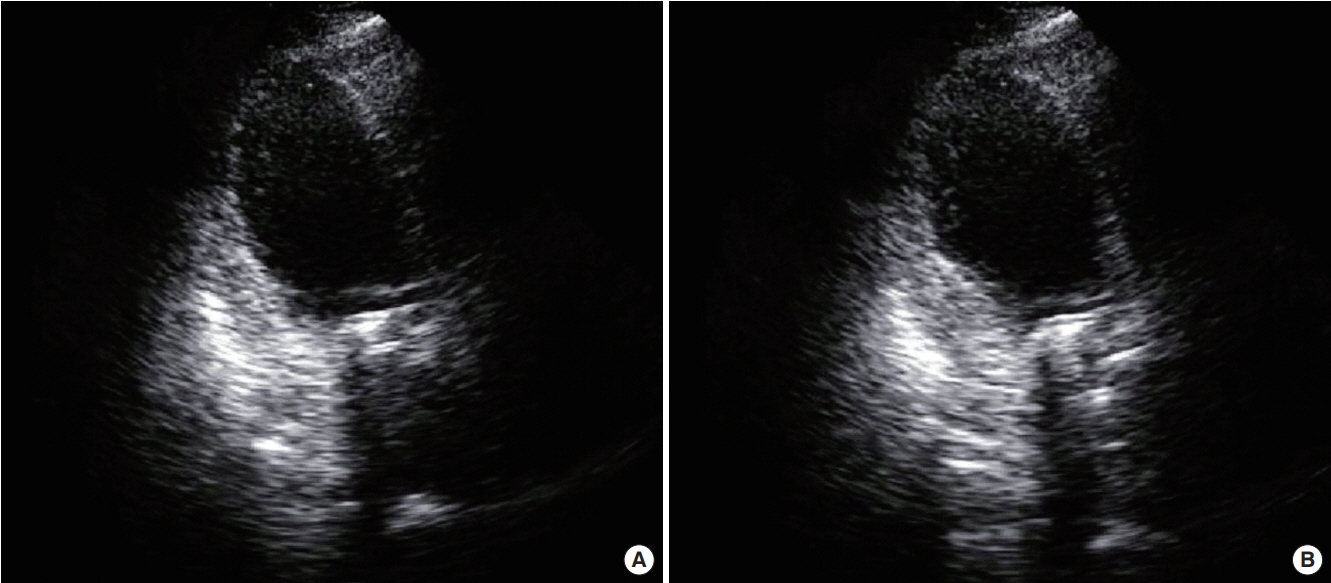Acute Crit Care.
2020 Feb;35(1):51-55. 10.4266/acc.2018.00304.
Extracorporeal membrane oxygenation for takotsubo cardiomyopathy that developed after mitral valve replacement
- Affiliations
-
- 1Department of Anesthesiology and Pain Medicine, Kyung Hee University College of Medicine, Seoul, Korea
- 2Department of Anesthesiology and Pain Medicine, Seoul Sungsim General Hospital, Seoul, Korea
- 3Department of Thoracic and Cardiovascular Surgery, Kyung Hee University School of Medicine, Seoul, Korea
- KMID: 2500952
- DOI: http://doi.org/10.4266/acc.2018.00304
Abstract
- Takotsubo cardiomyopathy is a transient systolic and diastolic left ventricular dysfunction that presents several wall-motion abnormalities, while the coronary artery shows normal findings. Because patients with Takotsubo cardiomyopathy present with symptoms similar to acute coronary syndrome, the initial diagnosis and treatment are often difficult. The condition is often precipitated by acute emotional or physical stress and frequently occurs in postmenopausal women. Takotsubo cardiomyopathy may also occur in the perioperative period after cardiac and noncardiac surgery; surgery-associated Takotsubo cardiomyopathy reportedly accounts for 3%–23% of all cases. Of these perioperative cases, cardiothoracic surgery accounted for 16%. However, few cases have been reported in patients undergoing cardiac surgery and managed with extracorporeal membrane oxygenation (ECMO). We report a case of Takotsubo cardiomyopathy managed with ECMO in a patient in the intensive care unit after mitral valve replacement.
Figure
Reference
-
1. Templin C, Ghadri JR, Diekmann J, Napp LC, Bataiosu DR, Jaguszewski M, et al. Clinical features and outcomes of Takotsubo (stress) cardiomyopathy. N Engl J Med. 2015; 373:929–38.2. Wittstein IS, Thiemann DR, Lima JA, Baughman KL, Schulman SP, Gerstenblith G, et al. Neurohumoral features of myocardial stunning due to sudden emotional stress. N Engl J Med. 2005; 352:539–48.
Article3. Lyon AR, Bossone E, Schneider B, Sechtem U, Citro R, Underwood SR, et al. Current state of knowledge on Takotsubo syndrome: a Position Statement from the taskforce on Takotsubo Syndrome of the Heart Failure Association of the European Society of Cardiology. Eur J Heart Fail. 2016; 18:8–27.
Article4. Stiermaier T, Eitel C, Desch S, Fuernau G, Schuler G, Thiele H, et al. Incidence, determinants and prognostic relevance of cardiogenic shock in patients with Takotsubo cardiomyopathy. Eur Heart J Acute Cardiovasc Care. 2016; 5:489–96.
Article5. Bonacchi M, Maiani M, Harmelin G, Sani G. Intractable cardiogenic shock in stress cardiomyopathy with left ventricular outflow tract obstruction: is extra-corporeal life support the best treatment? Eur J Heart Fail. 2009; 11:721–7.
Article6. Hessel EA 2nd. Takotsubo cardiomyopathy and its relevance to anesthesiology: a narrative review. Can J Anaesth. 2016; 63:1059–74.
Article7. Pergolini A, Zampi G, Casali G, Madeo A, Visconti CL, Cipullo PL, et al. Takotsubo syndrome after mitral valve replacement: case report and brief review of the literature. J Cardiothorac Vasc Anesth. 2015; 29:431–5.
Article8. Chiariello GA, Bruno P, Colizzi C, Crea F, Massetti M. Takotsubo cardiomyopathy following cardiac surgery. J Card Surg. 2016; 31:89–95.
Article9. Morris NA, Chatterjee A, Adejumo OL, Chen M, Merkler AE, Murthy SB, et al. The risk of Takotsubo cardiomyopathy in acute neurological disease. Neurocrit Care. 2019; 30:171–6.
Article10. Mukhtar A, Moharam H, Sarhan K, Hosni H, Salah M. Liver transplantation using dexmedetomidine in a patient with a history of Takotsubo cardiomyopathy. A A Case Rep. 2016; 6:14–6.
Article
- Full Text Links
- Actions
-
Cited
- CITED
-
- Close
- Share
- Similar articles
-
- Preoperative Extracorporeal Membrane Oxygenation for Severe Ischemic Mitral Regurgitation: 2 case reports
- Mitral Valve Replacement with a Pulmonary Autograft in an Infant
- A Case of Reversal of Takotsubo Cardiomyopathy in Patient with Pheochromocytoma
- Catastrophic catecholamine-induced cardiomyopathy rescued by extracorporeal membrane oxygenation in recurrent malignant pheochromocytoma
- A Case of Takotsubo Cardiomyopathy in a Young Female with Infective Endocarditis



